

Delaware also ranks 24th among states in providing access to three-year-olds, a decrease from the previous ranking of 22nd. Delaware recently came in 42nd in providing access to state-funded pre-K to four-year-olds, down from 41st the previous year. The State Chamber of Commerce and the largest Rotary Club in Delaware have been receptive to Rodel’s research and are collecting input from their members, hosting meetings where parents and providers speak, speaking up at hearings, and producing documents with shared messages.īayard says Rodel leveraged NIEER’s expertise in making recommendations for expanding access to pre-k as well as their annual State of Preschool ratings. When the business community hears about employers who would like to expand their business but can’t because they can’t find the people, they start taking notice like never before. Skyrocketing care costs prevent parents from making choices like taking a job, increasing hours at work, going back to school, and buying a home.

“I pay $1,000 more a month than my mortgage for child care.” “Child care is insanely expensive,” one parent responded. Rodel relies on the Alliance to get rapid responses from experts they wouldn’t otherwise have access to as well as for help with longer collaborative projects, including a survey of more than 300 Delaware parents and caregivers that showed child care expenses are holding 81% of families back from improving their situation in at least one way. “We’ve reached out through the Alliance to at least six national partners in the past few years,” she says. This technical assistance takes many forms, and Bayard and her team seize upon all they can get. Madeleine Bayard, senior vice president of Rodel, a nonprofit focused on public education in Delaware, explains the momentum this way: “We have more champions and a bigger tent than ever.”Īmong other factors, Bayard credits the strategic insights and content knowledge provided by partners of the Alliance for Early Success, including the National Institute for Early Education Research (NIEER) and National Women’s Law Center (NWLC). Spurred by consequences of the pandemic as well as an increasingly vocal and well-organized advocacy community, these changes bring Delaware in line with federal recommendations, enable child care providers to compete for talent, and ensure wider access to care for low-income families. Multi-State Early Childhood Policy Initiatives.


 0 kommentar(er)
0 kommentar(er)
